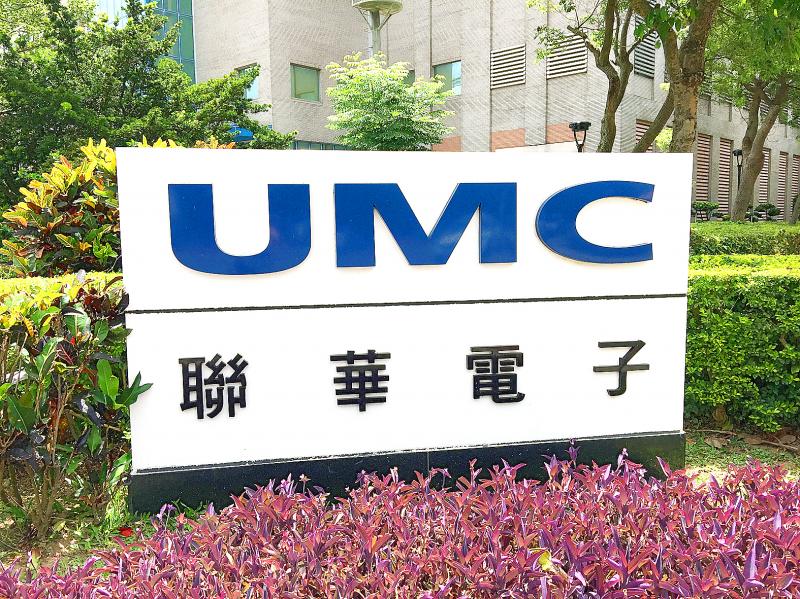United Microelectronics Corp (UMC, 聯電), the world’s No. 4 contract chipmaker, yesterday posted its strongest quarterly net profit in 14 years as work-from-home and remote-schooling trends continued to drive demand for power management chips used in smartphones and high-speed interface controllers.
Net profit last quarter soared 36.37 percent to NT$9.11 billion (US$315.07 million) from NT$6.68 billion in the second quarter.
That represented a 210 percent increase from NT$2.93 billion in the third quarter of last year.

Photo: Hung Yu-fang, Taipei Times
Earnings per share rose to NT$0.75, from NT$0.55 a quarter earlier and NT$0.25 a year earlier.
“Demand from consumer and computer-related applications will lead to a slight increase in wafer shipments, propelled by ongoing work-from-home initiatives and home schooling,” UMC copresident Jason Wang (王石) said.
“Furthermore, we have seen an uptick in semiconductor demand thanks to more silicon content in particular applications, such as newly launched 5G smartphones, Internet-of-Things devices and other consumer products,” he said.
UMC expects this to significantly increase demand for 28-nanometer chips this quarter, he added.
Overall, wafer shipments this quarter are expected to rise 1 to 2 percent from the third quarter, while the average sales price is expected to increase 1 percent and factory utilization to edge down from 97 percent in the third quarter to 95 percent, he said.
Gross margin is likely to remain flat from the third quarter’s 21.8 percent, due to the appreciation of New Taiwan dollar against the US dollar, Wang said.
Every 1 percent appreciation in the NT dollar reduces UMC’s gross margin by 0.5 percentage points, the chipmaker said.
“We expect this business traction to continue into 2021. Our overall business outlook is healthy. Our utilization rate will remain very high,” Wang said.
As the outlook for 8-inch wafers remains favorable for foundries, UMC plans to increase 8-inch wafer prices next year, while keeping prices for 12-inch wafers unchanged, he said.
This quarter, the price adjustment would only be applied to incremental orders, he added.
To resolve capacity issues, UMC is “carefully evaluating our capital for expansion and considering in what ways we should expand capacity to meet customer demand,” Wang said.
The firm is exploring whether it would be optimal to expand through an “organic” or “inorganic” approach, or through an acquisition, Wang said.
The firm’s board of directors yesterday authorized the management team to participate in bidding for potential investment targets.
The board also gave the go-ahead for an additional budget of NT$14.79 billion for new equipment purchases and working capital.
UMC’s capital expenditure this year remained US$1 billion.
The chipmaker plans to scale up 12-inch wafer capacity at its Xiamen fab in China to 25,000 wafers per month from 18,000 wafers, Wang said, adding that most of the new capacity would be for producing 28-nanometer chips.
UMC said it would seek order transfers after the US imposed export restrictions on China’s Semiconductor Manufacturing International Corp (中芯國際).
“It is our belief that it [geopolitical tension] will have some impact on the foundry landscape, particularly on customers’ sourcing strategies. Some customers are trying to diversify their foundry sourcing strategies,” Wang said.

Among the rows of vibrators, rubber torsos and leather harnesses at a Chinese sex toys exhibition in Shanghai this weekend, the beginnings of an artificial intelligence (AI)-driven shift in the industry quietly pulsed. China manufactures about 70 percent of the world’s sex toys, most of it the “hardware” on display at the fair — whether that be technicolor tentacled dildos or hyper-realistic personalized silicone dolls. Yet smart toys have been rising in popularity for some time. Many major European and US brands already offer tech-enhanced products that can enable long-distance love, monitor well-being and even bring people one step closer to

Malaysia’s leader yesterday announced plans to build a massive semiconductor design park, aiming to boost the Southeast Asian nation’s role in the global chip industry. A prominent player in the semiconductor industry for decades, Malaysia accounts for an estimated 13 percent of global back-end manufacturing, according to German tech giant Bosch. Now it wants to go beyond production and emerge as a chip design powerhouse too, Malaysian Prime Minister Anwar Ibrahim said. “I am pleased to announce the largest IC (integrated circuit) Design Park in Southeast Asia, that will house world-class anchor tenants and collaborate with global companies such as Arm [Holdings PLC],”

TRANSFORMATION: Taiwan is now home to the largest Google hardware research and development center outside of the US, thanks to the nation’s economic policies President Tsai Ing-wen (蔡英文) yesterday attended an event marking the opening of Google’s second hardware research and development (R&D) office in Taiwan, which was held at New Taipei City’s Banciao District (板橋). This signals Taiwan’s transformation into the world’s largest Google hardware research and development center outside of the US, validating the nation’s economic policy in the past eight years, she said. The “five plus two” innovative industries policy, “six core strategic industries” initiative and infrastructure projects have grown the national industry and established resilient supply chains that withstood the COVID-19 pandemic, Tsai said. Taiwan has improved investment conditions of the domestic economy

Sales in the retail, and food and beverage sectors last month continued to rise, increasing 0.7 percent and 13.6 percent respectively from a year earlier, setting record highs for the month of March, the Ministry of Economic Affairs said yesterday. Sales in the wholesale sector also grew last month by 4.6 annually, mainly due to the business opportunities for emerging applications related to artificial intelligence (AI) and high-performance computing technologies, the ministry said in a report. The ministry forecast that retail, and food and beverage sales this month would retain their growth momentum as the former would benefit from Tomb Sweeping Day